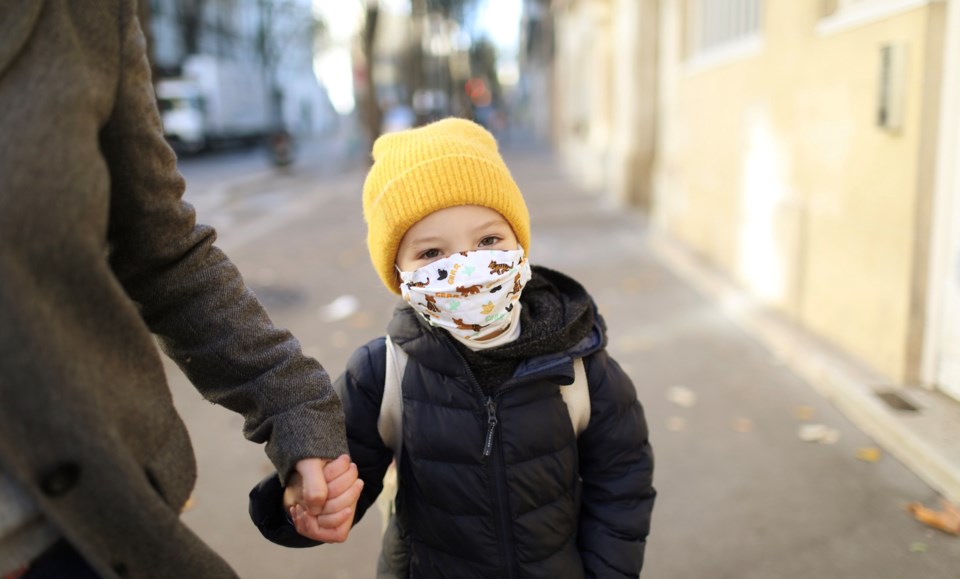B.C.'s continues to have high numbers of new COVID-19 infections, with those infected often developing illnesses serious enough to require hospitalization, and in some cases help breathing in intensive care units (ICUs).
Deaths have also been rising, as 11 more people losing their lives to the pandemic in B.C. in the past 24 hours. That raises the province's pandemic death toll to 1,973.
Some good news is that B.C.'s hospital system has a lot of capacity.
B.C. has a total of 11,571 hospital beds, including all beds that were in place pre-pandemic, dubbed "base beds," and new ones recently added for emergency use, known as "surge beds." The 328 COVID-19 patients now in hospital are therefore consuming 2.8% of B.C.'s hospital-bed capacity.
A greater proportion of B.C.'s ICU beds are occupied by COVID-19 patients. Those units are housing 138 COVID-19 patients in 728 beds, so about 19% of those wards' capacity is consumed by COVID-19 patients.
The hospital and ICU totals, however, only include patients who entered hospital because they had COVID-19, and who have not yet gone 10 days after first feeling symptoms. The totals do not include patients who entered hospital because they had COVID-19 and have since gone more than 10 days after first feeling symptoms because those individuals are no longer considered infectious. The totals also do not include patients who went to hospital for another reason, and then contracted COVID-19.
Provincial health officer Bonnie Henry recently said that "about 140" people are in B.C. hospitals are either COVID-19 patients no longer deemed infectious, or people who contracted COVID-19 while in hospitals.
Another 714 people have been diagnosed as having COVID-19 in the past day, raising the total number of known COVID-19 infections in B.C. to 187,694 since the first case was diagnosed on January 28, 2020.
More than 95.3%, or 178,980 of those are deemed by the province to have recovered because they have gone 10 days after first feeling symptoms, and are therefore not thought to be infectious.
In total, 6,317 people across the province are actively battling COVID-19 infections.
Henry said October 1 that to limit the spread of COVID-19, she is putting in effect a . Previously, only children in grades four through 12 were required to wear masks.
The new province-wide mask mandate for that younger age group follows school boards in Vancouver and Surrey mandating face masks for all students in those jurisdictions.
Calls increased for the mask mandates among younger students following data released earlier this week that show that between September 17 and 23, the BC Centre for Disease Control recorded 1,086 new COVID-19 infections in people aged 17 years, and younger. More than half of those infections were in children aged between five and 11 years.
“The rates that we’re seeing right now of COVID-19 per 100,000 population is going up quite dramatically, particularly in those younger school-age children who are not yet eligible for vaccination," Henry said earlier this week.
The rise in infections in that age group is particularly acute in parts of the province, such as the Northern Health region, where vaccination rates are lower, she added.
New vaccinations continue to crawl along at a sluggish pace, compared to a few months ago, largely because the vast majority of British Columbians have already received their needed two doses.
Health officials provided 6,584 doses of vaccine to British Columbians in the past day, with 1,449 of those being to unvaccinated individuals, and 4,685 going to those needing second doses. No data was available for any third doses, which have started to be administered to those who are considered extremely vulnerable, and immunocompromised.
Of the 4,079,918 B.C. residents who have received one dose of vaccine since mid-December, 2020, nearly 92.2%, or 3,761,048, are fully vaccinated, with two doses.
Across B.C., 88% of eligible adults older than 12 have had at least one dose of vaccine, with 81.1% of those eligible people having had two doses, according to the B.C. government.
The B.C. government estimated in July that the , so Glacier Media's calculation is that 79.3% of B.C.'s total population has had at least one dose of vaccine, and 73.1% of the province's total population has had two doses.
The hardest hit region for new and active infections, on a per capita basis, remains Northern Health.
Glacier Media's math shows the number of new infections per health region, for each 10,000 residents (with total new cases in brackets) is:
• 1.5 in Fraser Health (274);
• 0.6 in Vancouver Coastal Health (73);
• 2.8 in Interior Health (205);
• 3.5 in Northern Health (106); and
• 0.7 in Island Health (56).
There were no known new infections in people who normally do not reside in B.C.
The result by health region for the 6,317 people fighting active infections for each 10,000 residents (with total new cases in brackets) is:
• 13.1 in Fraser Health (2,353);
• 7.1 in Vancouver Coastal Health (889);
• 18.3 in Interior Health (1,360);
• 34.8 in Northern Health (1,043); and
• 7.2 in Island Health (614).
The active case counts include 58 people who normally live outside B.C.
Unvaccinated people are the ones driving infections, serious illness and death.
Of the 426 hospitalizations in the two weeks ended September 29, there were:
• 302 not vaccinated (70.9%);
• 42 partially vaccinated (9.9%); and
• 82 fully vaccinated (19.2%).
The 5,152 cases in the week ended September 29 included:
• 3,311 (64.3%) unvaccinated;
• 359 (7%) partially vaccinated; and
• 1,482 (28.8%) fully vaccinated.
There are 22 active outbreaks at seniors' homes and other health-care settings. •




